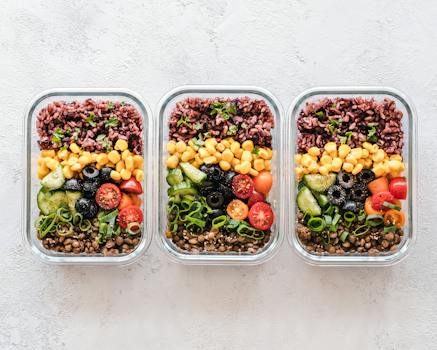
Meal planning is a crucial aspect of maintaining a healthy lifestyle and achieving specific dietary goals. Whether you are aiming to lose weight, gain muscle, or simply improve your overall well-being, having a comprehensive meal plan can make a significant difference. This guide will delve into the importance of meal planning, highlighting its benefits and providing practical tips to help you effectively plan and prepare your meals. By incorporating meal planning into your routine, you can take control of your nutrition and set yourself up for success on your wellness journey.
- 1. Introduction
- 2. Saves Time
- 2.1. Reduces daily cooking time
- 2.2. Eliminates last-minute meal decisions
- 2.3. Streamlines grocery shopping
- 3. Saves Money
- 3.1. Reduces food waste
- 3.2. Minimizes impulsive food purchases
- 3.3. Allows for budget-friendly meal choices
- 4. Promotes Health
1. Introduction
Meal planning is a crucial aspect of maintaining a healthy lifestyle and achieving your desired fitness goals. It involves carefully selecting and organizing your meals in advance, taking into consideration your nutritional needs, preferences, and schedule. By dedicating some time and effort to meal planning, you can save money, reduce food waste, and ensure that you are consuming a well-balanced diet. This comprehensive guide will delve into the various benefits of meal planning, providing you with valuable insights and practical tips to get started on your journey towards a more organized and nourishing approach to eating.
1.1. Definition of meal planning
Meal planning is the process of organizing and preparing meals in advance. It involves making a detailed plan of what to eat for a certain period, usually a week or a month, and creating a shopping list accordingly. Meal planning takes into consideration factors such as dietary preferences, nutritional needs, budget, and available time for cooking. By carefully planning meals, individuals can ensure a well-balanced diet, save time and money, reduce food waste, and make healthier food choices. It also helps in avoiding the last-minute stress of deciding what to cook and makes grocery shopping more efficient.
1.2. Benefits of meal planning
Meal planning is a crucial aspect of maintaining a healthy lifestyle. It involves the process of deciding in advance what meals to prepare and consume over a specific period. By taking the time to plan your meals, you can reap numerous benefits that will positively impact your overall well-being.
One of the key advantages of meal planning is that it helps you make healthier food choices. When you plan your meals in advance, you have the opportunity to include a variety of nutritious foods such as fruits, vegetables, whole grains, and lean proteins. This ensures that you are getting all the essential nutrients your body needs.
Another benefit of meal planning is that it can save you time and money. By knowing exactly what ingredients you need for each meal, you can make a comprehensive shopping list and avoid unnecessary purchases. Additionally, by cooking larger portions and having leftovers, you can reduce food waste and stretch your budget further.
Meal planning also promotes portion control. When you have a set plan for your meals, you are less likely to overeat or indulge in unhealthy snacks. This can be particularly beneficial for those trying to manage their weight or improve their eating habits.
Furthermore, meal planning can help reduce stress and simplify your daily routine. When you have meals planned out, you eliminate the need to constantly think about what to cook for each meal. This can free up mental space and allow you to focus on other important tasks or activities.
In conclusion, meal planning provides several advantages, including healthier food choices, time and money savings, portion control, and reduced stress. Incorporating this practice into your lifestyle can lead to overall improved health and well-being.
1.3. Importance of meal planning
Meal planning is a crucial aspect of maintaining a healthy lifestyle. It involves carefully selecting and organizing meals and snacks for a specific period, usually a week or two. By taking the time to plan your meals in advance, you can ensure that you are consuming a balanced diet that meets your nutritional needs. Meal planning offers numerous benefits, including saving time and money, reducing food waste, and promoting better eating habits. In this comprehensive guide, we will explore the importance of meal planning and provide useful tips and strategies to help you get started.
2. Saves Time
Meal planning is a crucial aspect of maintaining a healthy lifestyle. It involves organizing and preparing meals in advance, which can save a significant amount of time in the long run. By dedicating a small amount of time each week to plan and prepare meals, individuals can avoid the stress and time constraints of figuring out what to cook on a daily basis.
One of the main benefits of meal planning is that it helps to save time during the busy weekdays. With a well-thought-out meal plan, individuals can minimize the time spent on grocery shopping, as they already have a list of ingredients needed for the week. This eliminates the need for multiple trips to the store and prevents impulsive purchases, ultimately saving time and money.
Additionally, meal planning allows for efficient use of time in the kitchen. By prepping and cooking meals in advance, individuals can avoid the need to spend hours each day preparing dinner. Instead, they can simply reheat the pre-made meals or quickly assemble them, saving valuable time that can be utilized for other activities.
Moreover, meal planning helps individuals stay organized and reduces the time spent on decision-making. With a set plan in place, there is no need to spend unnecessary time contemplating what to cook each day. This eliminates the stress and guesswork, making mealtime more enjoyable and efficient.
In conclusion, meal planning is an essential practice that can save a significant amount of time. By dedicating a small portion of time each week to plan and prepare meals, individuals can streamline their cooking process, reduce grocery shopping time, and eliminate the stress of daily decision-making. Meal planning ultimately allows for a more efficient use of time and promotes a healthier lifestyle.
2.1. Reduces daily cooking time
Meal planning is an essential practice that can significantly reduce daily cooking time. By carefully planning and preparing meals in advance, individuals can save valuable time in the kitchen. The process involves organizing and scheduling meals for the week, taking into account dietary needs, preferences, and the availability of ingredients. By doing so, individuals can streamline their cooking process and eliminate the need for last-minute trips to the grocery store or frantic searches for recipe ideas. With a well-thought-out meal plan, everything from grocery shopping to meal preparation becomes more efficient, allowing individuals to spend less time in the kitchen and more time on other activities they enjoy.
2.2. Eliminates last-minute meal decisions
Eliminates last-minute meal decisions
Meal planning is the process of pre-determining what meals you will eat for a certain period of time, typically a week or a month. By taking the time to plan your meals in advance, you eliminate the need to make last-minute meal decisions.
One of the biggest challenges of modern life is finding the time to cook healthy and delicious meals. With our hectic schedules and numerous responsibilities, it’s no wonder that many people resort to unhealthy fast food or takeout options. However, meal planning can help solve this problem by ensuring that you always have a plan in place and all the necessary ingredients on hand. This means that you won’t have to spend time each day thinking about what to cook or running to the grocery store to grab missing ingredients.
By eliminating last-minute meal decisions, meal planning saves you time and reduces stress. Instead of spending precious minutes each day trying to come up with a dinner idea or searching for a recipe, you can simply refer to your meal plan and start cooking. This not only saves time but also allows you to focus on other important tasks or enjoy some downtime.
In addition, meal planning can help you make healthier choices. When you plan your meals in advance, you have more control over the ingredients and portion sizes. You can ensure that your meals are balanced and include a variety of nutritious foods. This can be especially beneficial for individuals with dietary restrictions or specific health goals.
Overall, meal planning is a valuable practice that eliminates last-minute meal decisions, saves time, and promotes healthier eating habits. Whether you are a busy professional, a parent, or simply looking to improve your overall well-being, incorporating meal planning into your routine can have a positive impact on your life.
2.3. Streamlines grocery shopping
Streamlining grocery shopping can greatly save time and make the process more efficient. By planning meals in advance, individuals can create a detailed shopping list that includes all the necessary ingredients for their planned meals. This eliminates the need for multiple trips to the grocery store and reduces the risk of forgetting essential items. Additionally, meal planning allows for better organization of shopping trips, as individuals can group similar items together on their list and navigate the store more quickly. By streamlining the grocery shopping process, individuals can free up time for other important tasks and activities in their daily lives.
3. Saves Money
Meal planning is a crucial practice that can greatly contribute to saving money. By carefully planning and organizing your meals, you can avoid unnecessary expenses and make the most of your budget. Here are some key reasons why meal planning is important for saving money.
1. Minimize Impulse Purchases: When you plan your meals in advance, you can create a detailed shopping list with all the necessary ingredients. This helps you avoid making impulsive purchases at the grocery store, as you are more focused and less likely to be tempted by unnecessary items.
2. Reduce Food Waste: Meal planning allows you to utilize ingredients more efficiently, which helps in reducing food waste. By knowing exactly what you need for each meal, you can buy the right quantities and avoid buying excess food that might go unused and eventually spoil.
3. Take Advantage of Sales and Discounts: With meal planning, you can take advantage of sales and discounts offered by grocery stores. By knowing what you need in advance, you can stock up on items when they are on sale, helping you save money in the long run.
4. Eat Out Less Often: When you have a meal plan in place, you are less likely to eat out frequently. Eating at restaurants or ordering takeout can quickly add up and strain your budget. By cooking meals at home based on your plan, you can save a significant amount of money.
5. Bulk Buying and Batch Cooking: Meal planning allows you to incorporate bulk buying and batch cooking into your routine. Buying in bulk often offers better prices, and batch cooking allows you to prepare multiple meals at once, saving time and energy.
In conclusion, meal planning is an essential tool for saving money. By being intentional with your meal choices, you can reduce impulse purchases, minimize food waste, take advantage of sales, eat out less often, and incorporate cost-effective practices like bulk buying and batch cooking.
3.1. Reduces food waste
Reducing food waste is not only beneficial for the environment but also for your wallet. By effectively planning your meals, you can minimize the amount of food that goes to waste. Here are some ways meal planning can help you save money:
1. Avoiding impulse purchases: When you plan your meals in advance, you know exactly what ingredients you need. This eliminates the need for last-minute trips to the grocery store where you might be tempted to buy unnecessary items.
2. Using leftovers creatively: Meal planning allows you to make the most out of leftovers. Instead of throwing away unused ingredients or meals, you can repurpose them into new dishes. This not only reduces waste but also saves you from buying additional ingredients.
3. Buying in bulk: When you plan your meals, you can take advantage of bulk buying. Purchasing ingredients in larger quantities can often be more cost-effective. By buying in bulk, you can save money in the long run.
4. Minimizing spoilage: Meal planning helps you use up perishable items before they go bad. By incorporating these ingredients into your meals, you can prevent them from ending up in the trash.
In conclusion, meal planning is a practical way to reduce food waste and save money. By being mindful of your meals, you can make a positive impact on both your budget and the environment.
3.2. Minimizes impulsive food purchases
Minimizing impulsive food purchases can greatly help in saving money. When we go grocery shopping without a plan, we often end up buying items that we don’t really need or that aren’t on our shopping list. These impulsive purchases can add up quickly and significantly increase our grocery bills. However, by implementing a meal planning strategy, we can effectively avoid such impulsive buying habits. Meal planning involves carefully deciding what meals and snacks to prepare for the week ahead, creating a detailed shopping list, and sticking to it. By having a clear plan in place, we are less likely to be tempted by unnecessary items while shopping, resulting in significant savings. Additionally, meal planning allows us to take advantage of sales, discounts, and bulk buying options, further reducing our expenses. By being intentional with our food purchases, we not only save money but also ensure that we have a well-balanced and nutritious meal for ourselves and our families.
3.3. Allows for budget-friendly meal choices
Meal planning is an essential part of maintaining a budget-friendly lifestyle. By carefully planning your meals, you can save a significant amount of money on your grocery bills. This comprehensive guide will provide you with the necessary information to effectively plan your meals and make budget-friendly choices.
One of the key benefits of meal planning is that it allows for budget-friendly meal choices. When you plan your meals in advance, you can take advantage of sales, discounts, and seasonal produce. By incorporating these cost-effective ingredients into your meal plan, you can create delicious and nutritious meals without breaking the bank.
Meal planning also saves money by reducing food waste. When you plan your meals, you can accurately estimate the quantities of ingredients needed, resulting in less leftover food that often goes to waste. Additionally, by having a clear plan for your meals, you are less likely to make impulse purchases or dine out, which can be costly.
Furthermore, meal planning allows you to take advantage of bulk buying and cooking in batches. By purchasing ingredients in larger quantities, you can often save money per unit. You can also prepare meals in advance and freeze them for later use, reducing the need for expensive takeout or convenience foods.
In conclusion, meal planning is a valuable tool for anyone looking to save money and make budget-friendly choices. By carefully planning your meals, taking advantage of sales and discounts, minimizing food waste, and utilizing bulk buying and batch cooking, you can significantly reduce your food expenses while still enjoying delicious and nutritious meals.
4. Promotes Health
Meal planning is a crucial aspect of maintaining a healthy lifestyle. By taking the time to plan and prepare your meals in advance, you can ensure that you are making nutritious choices and avoiding the temptation of unhealthy options. One of the key benefits of meal planning is that it allows you to have full control over the ingredients that go into your meals. This means that you can avoid processed and unhealthy foods, opting instead for fresh and wholesome ingredients. Additionally, meal planning can help you save both time and money. By planning your meals ahead of time, you can make efficient trips to the grocery store and avoid impulse purchases. This can not only save you money but also reduce food waste. Moreover, meal planning enables you to prioritize your health and well-being. By having a plan in place, you are less likely to resort to convenience foods or takeout meals, which are often high in calories, sodium, and unhealthy fats. Instead, you can enjoy balanced and nutritious meals that support your overall health and promote weight management. In conclusion, meal planning is an essential tool for promoting health and well-being. It allows you to make intentional choices about the food you consume, helps you save time and money, and enables you to prioritize your health goals.
4.1. Encourages balanced and nutritious meals
Encouraging balanced and nutritious meals is essential for promoting good health. By incorporating a variety of food groups and ensuring the right portion sizes, meal planning can play a crucial role in maintaining a well-balanced diet. A balanced meal consists of high-quality proteins, whole grains, fruits, vegetables, and healthy fats. These components provide the necessary nutrients, vitamins, and minerals that support proper functioning of the body. Moreover, a balanced meal helps in maintaining stable blood sugar levels, preventing energy crashes, and boosting overall energy levels throughout the day. By planning meals in advance, individuals can ensure that their dietary needs are met, leading to improved overall health and well-being.
4.2. Prevents unhealthy food choices
One of the key benefits of meal planning is that it helps prevent unhealthy food choices. When we don’t have a plan for what to eat, we are more likely to make impulsive decisions and reach for convenient, processed foods that are often high in calories, unhealthy fats, and added sugars. These types of foods can contribute to weight gain, increased risk of chronic diseases, and poor overall health.
By taking the time to plan our meals in advance, we can ensure that we are making healthier choices. Meal planning allows us to incorporate a variety of nutrient-dense foods such as fruits, vegetables, whole grains, lean proteins, and healthy fats into our diet. It helps us create balanced meals that provide the essential vitamins, minerals, and antioxidants our bodies need to function optimally.
Additionally, meal planning allows us to control portion sizes and avoid mindless eating. When we have pre-portioned meals and snacks ready to go, we are less likely to overeat or indulge in unhealthy snacks. Planning our meals also enables us to prioritize home-cooked meals over dining out or ordering takeout, where we have less control over the ingredients and cooking methods used.
Overall, meal planning promotes healthier food choices by providing structure, organization, and the opportunity to make conscious decisions about what we put into our bodies. It helps us break free from unhealthy eating patterns and develop a sustainable approach to nourishing ourselves.
4.3. Supports weight management
Meal planning plays a crucial role in supporting weight management. By carefully selecting and preparing meals in advance, individuals can control their calorie intake and make healthier food choices. Planning meals ahead of time also helps to reduce impulsive food decisions, such as ordering takeout or grabbing unhealthy snacks on the go. Additionally, meal planning allows for portion control, ensuring that individuals consume appropriate serving sizes. This practice promotes mindful eating and can prevent overeating. Furthermore, a well-planned meal schedule can help regulate metabolism and stabilize blood sugar levels, contributing to overall weight management and a healthier lifestyle.
Conclusion
In conclusion, meal planning is a crucial aspect of maintaining a healthy and balanced lifestyle. It not only saves time and money, but also helps to ensure that you consume nutritious meals regularly. By taking the time to plan your meals in advance, you can make better food choices, avoid unhealthy options, and easily achieve your dietary goals. So, start incorporating meal planning into your routine and enjoy the numerous benefits it brings to your overall well-being.


